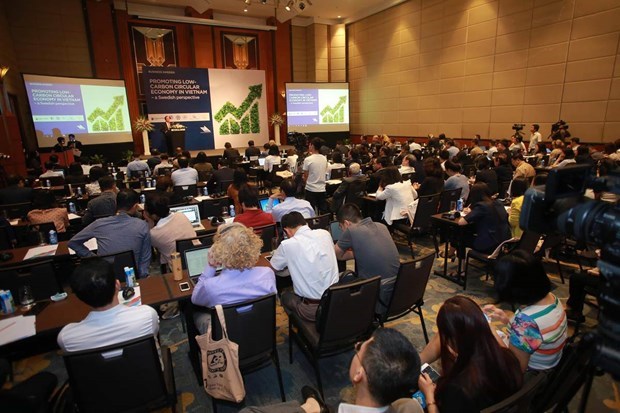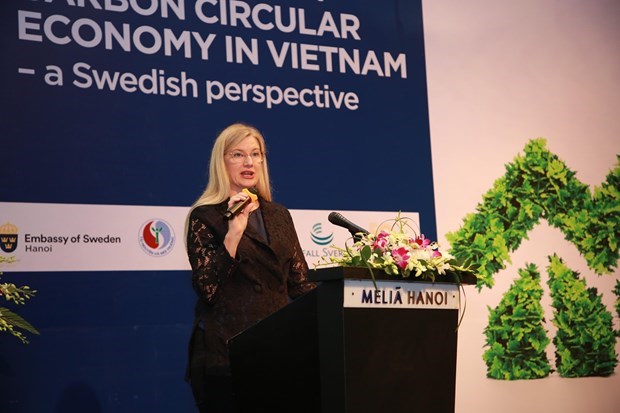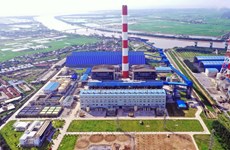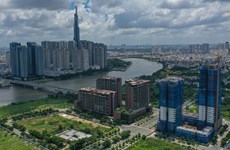Vietnam should make economy go circular: Swedish experts
Hanoi (VNA) – Embracing circular economy will help Vietnam respond to natural resources starvation and environmental pollution, while heading towards sustainable economic development, Swiss experts said at a workshop held by the Swedish Embassy, the Ministry of Natural Resources and Environment and the Hanoi People’s Committee on November 12.
 Deputy minister of Natural Resources and Environment Vo Tuan Nhan said Vietnam is facing formidable challenges in natural resources starvation (Photo: VietnamPlus)
Deputy minister of Natural Resources and Environment Vo Tuan Nhan said Vietnam is facing formidable challenges in natural resources starvation (Photo: VietnamPlus)
Main barriers to Vietnam’s circular economy
At the Workshop on Promoting Low-Carbon Circular Economy in Vietnam, Deputy Minister of Natural Resources and Environment Vu Tuan Nhan said after a long time of depending on and spending natural resources, Vietnam has made significant improvements in its socio-economic conditions. However, the country has had to trade off economic growth for environmental change and pollution.
“Transforming the current economic model to the circular economy is a suitable action that Vietnam is striving for so that it achieves the sustainable development goals,” he stressed.
In the past time, the Vietnamese Government has issued a multitude of policies on shifting economic growth model towards sustainable development, enhancing management of natural resources, protecting the environment, and encouraging recycling to branch out the circular economic model.
Two years ago, the Prime Minister approved a project to form an environment industry that can meet the contents of the circular economy by 2025.
Thanks to the efforts, several models that nearly fit the circular economy have been shaped up in Vietnam such as eco-industrial zones in Ninh Binh, Can Tho and Da Nang, helping save 6.5 million USD per year by using technology, efficiently utilising natural resources.
However, Nhan added businesses’ weak capacity in recycling technologies together with consumers’ habit of using single-use plastic items have made it hard for the economy to go circular.
Foreign experts at the event also described waste collection and recycling as main barriers for Vietnam when applying the circular economic model.
Notably, Vietnam’s waste volume is forecast to double in the next 15 years while only 10 percent of the total waste is collected and recycled.
With 13 million tonnes of waste released to the ocean every year, the country ranks 17th in the world for ocean plastic waste pollution.
Although there are no official statistics on the amount and varieties of plastic in the Vietnamese sea and islands, plastic waste is easy to see in Vietnamese waters, with the country’s 112 estuaries being the main gateways of plastic to the ocean.
“Therefore, the MoNRE wants to work with Swiss organisations to learn experience in boosting public and private cooperation to have an overview about the circular economy”, Nhan deed.
A wealth of experience in recycling revolution from Sweden
Swedish Ambassador to Vietnam Ann Mawe said a circular economy will benefit both consumers and businesses.
She said: “Companies that are moving in this direction have proved that recycled products can be more cost effective than creating them from scratch.
“Production costs are reduced, so the selling price is also lowered, thereby benefiting consumers. I hope this is an inspiration for Vietnamese businesses,” said the ambassador.
 Swedish Ambassador to Vietnam Ann Mawe said Sweden is willing to share experience with Vietnam. (Photo: VietnamPlus)
Swedish Ambassador to Vietnam Ann Mawe said Sweden is willing to share experience with Vietnam. (Photo: VietnamPlus)
According to the Swedish diplomat, Sweden is a leading country in the world in waste management and recycling. In the past two decades, the percentage of recycled waste by households has increased from 38 percent in 1975 to at least 99 percent today. In 2001, 22 percent of rubbish was landfilled in Sweden; however, today the landfilled waste share is only one percent of the total.
As Swedish recycling is so successful, the country is importing rubbish, with average 2.3 million tonnes of waste purchased every year.
Circular economy means waste reduction, reuse and recycling, she said, adding Sweden stands ready to share its experience with Vietnam.
Meanwhile, Jeffrey Fielkow, Managing Director at Tetra Pak Vietnam, shared the firm’s initiatives to protect the environment since it developed its brand in the Southeast Asian country.
He said that besides recycling and reuse, carbon emission impact must be counted in the circular economy.
The company is targeting 42 percent in greenhouse gas emission by 2030, and has committed to use renewable power, he added.
According to Nguyen Hoang Nam from the Ministry of Natural Resources and Environment (MoNRE), World Bank in 2019 estimated that the impacts of environmental pollution might cut off 3.5 percent of Vietnam's GDP in 2035.
Other statistics were also provided to prove the traditional linear economy was hampering natural resources, increasing waste volume and pulling down the world’s socio-economic development.
“The statistics create a big question whether we are moving forward or backwards with the current economic model,” said Nam, who is also an official at the Institute of Strategy and Policy on Natural Resources and Environment.
He said it is important to promote the implementation of a circular economy to preserve and develop natural capital through rational use and re-generation of resources and use of renewable energy.
In addition, it would optimise the yield of resources and materials as much as possible in production cycles, and improve the overall system performance by minimising negative externalities through waste design, he said./.












